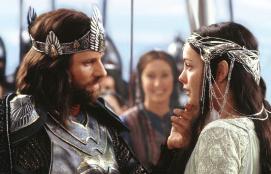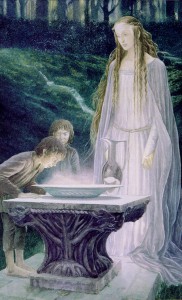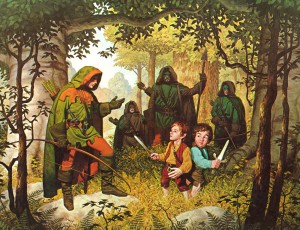
|
|
 |


|
|
|
|
|
|
|
|
|
|
|


News from Bree
spymaster@theonering.net
Mar 31 2014, 11:04am
Post #1 of 3
(354 views)
Shortcut
|
|
The theme of love in The Lord of the Rings
|
Can't Post
|
|
 In our latest TORn library piece, Ringer Tedoras muses on the theme of love within Lord of the Rings, and how it's more intricately-- and subtly -- woven into the text than we generally realise. In our latest TORn library piece, Ringer Tedoras muses on the theme of love within Lord of the Rings, and how it's more intricately-- and subtly -- woven into the text than we generally realise.
Love in The Lord of the Rings
By Tedoras
The pages of The Lord of the Rings contain a wealth of timeless themes. In the context of the greater struggle between Good and Evil, stories of virtue, loyalty, courage, and certainly love abound. The theme of love, in particular, is so intricately woven into Tolkien’s masterpiece that there is yet light to be shed on it.
Much of what admirers of The Lord of the Rings know about the role of love in the story comes from the film adaptations, in which those more evident elements (being the relationships between Aragorn and Arwen, Frodo and Sam, and the members of the Fellowship in general) are highlighted.
But Peter Jackson is not entirely to blame for pruning the Professor’s work; for even as readers we have the tendency to overlook the subtleties of this pervasive theme, remembering by the end only the selfsame “surface” elements that Mr. Jackson has highlighted, one or two particularly solemn quotations from one of the Wise, and half a snippet from the narrator’s many musings.
Yet, it is in the lesser-known, often-overlooked passages that we find the literary gold (or mithril, if you will) that is the representation of love in The Lord of the Rings.
In digging beneath these more well-known examples, we will discover just how fixed in the text the theme of love is. But, since the verisimilitudinous definition of love to which those “surface” elements lead us will be proved insufficient, we will also come to define love as Tolkien did (or at least reach a more lucid definition, if not his exact). We will note that the nidus of the theme of love lies not in those aforementioned exemplars (which many consider the quintessence of the theme), and that they are but the blossoming result of intricately woven roots that run many hundreds of pages deep.
[caption id="attachment_88163" align="alignright" width="182"] The Mirror of Galadriel by Alan Lee.[/caption] In laying the evidence, let us first journey to Lorien with the Fellowship, where some light can be shed on Tolkien’s definition of love. As we know, one of the gifts of the Lady of the Wood are the famous cloaks now synonymous with the Company of the Ring. Upon receipt of his, Pippin, filled with awe at the sight, wonders if it is a “magic cloak” (361). The response is quite poignant: The Mirror of Galadriel by Alan Lee.[/caption] In laying the evidence, let us first journey to Lorien with the Fellowship, where some light can be shed on Tolkien’s definition of love. As we know, one of the gifts of the Lady of the Wood are the famous cloaks now synonymous with the Company of the Ring. Upon receipt of his, Pippin, filled with awe at the sight, wonders if it is a “magic cloak” (361). The response is quite poignant:
“‘I do not know what you mean by that,’ answered the leader of the Elves. ‘They are fair garments, and the web is good, for it was made in this land. They are elvish robes certainly, if that is what you mean. Leaf and branch, water and stone: they have the hue and beauty of all these things under the twilight of Lorien that we love; for we put the thought of all that we love into all that we make’” (361).
The most applicable part of this quotation, when it comes to defining love as Tolkien did, is how the Elves “put the thought of all that [they] love into all that [they] make.” Here we must mark Pippin’s equation of love (and a work of love) with magic—magic being an enchanting and plendiferous embodiment of the purest natural emotion, such as is not oft beheld in the world.
And magic is not at all a supernatural phenomenon to this Elf; it is, rather, in his whole conception, a spatio-temporally-natural thing, being inspired by—and not distinct from—the world around him. Thus, we can add to Tolkien’s definition of love his own ideas on magic. This association between love and magic is also reinforced by Galadriel. At the Mirror, she tells Sam:
“‘And you?’ she said, turning to Sam. ‘For this is what your folk would call magic, I believe; though I do not understand clearly what they mean; and they seem to use the same word of the deceits of the Enemy’” (350).
Just as the aforementioned Elf, Galadriel cannot understand the hobbits’ loose use of the word “magic.” To her, it can only be linked to love, and works derived from love. She rejects wholly the notion that the term “magic” can be preferentially applied, that it is not as clearly a part of the noumenal realm to others as it is to her.
The distinction between the Enemy and those that oppose him is starkly framed in The Lord of the Rings; but, that it is a struggle between Love and Hate, beyond just Good and Evil, is manifested on a different textual level.
Fast forward a bit as we journey south now, to Ithilien. The young master Faramir is walking in the woods with his newfound halfling captives, his wisdom (clearly beyond his years) on full display:
“War must be, while we defend our lives against a destroyer who would devour all; but I do not love the bright sword for its sharpness, nor the arrow for its swiftness, nor the warrior for his glory. I love only that which they defend: the city of the Men of Numenor, and I would have her loved for her memory, her ancientry, her beauty, and her present wisdom” (656).
[caption id="attachment_88165" align="alignright" width="300"] Faramir by The Hildebrandt Brothers.[/caption] Here, Faramir shows a quality of such virtue and rarefied wisdom as we would normally prescribe to Gandalf. He proclaims, first, that he loves not a thing of war for how well it harms or kills, and he grudges fame as earned through such violent and wanton acts. Faramir goes to war never to rejoice in the glory of battle, to find joy in hateful acts (as, no doubt, the Enemy does), but to fight out of love: an abiding love for the beauty and august history of his native land. Faramir by The Hildebrandt Brothers.[/caption] Here, Faramir shows a quality of such virtue and rarefied wisdom as we would normally prescribe to Gandalf. He proclaims, first, that he loves not a thing of war for how well it harms or kills, and he grudges fame as earned through such violent and wanton acts. Faramir goes to war never to rejoice in the glory of battle, to find joy in hateful acts (as, no doubt, the Enemy does), but to fight out of love: an abiding love for the beauty and august history of his native land.
Whereas from hate the Enemy seeks to destroy, out of love Faramir seeks only to preserve. And yet another stark example comes to mind here. One of Aragorn’s very first tasks as King is to judge the fate of Beregond (who, if you remember, fended off to of his own in the service of the Citadel to prevent them from burning Faramir alive). Aragorn knows that, of old, the penalty for Beregond’s actions was death. However, what the King tells Beregond departs from this tradition:
“All penalty is remitted for your valour in battle, and still more because all that you did was for the love of the Lord Faramir. Nonetheless you must leave the Guard of the Citadel, and you must go forth from the City of Minas Tirith...So it must be, for you are appointed to the White Company, the Guard of Faramir...in the service of him for whom you risked all, to save him from death” (947-48).
How Aragorn’s decree relates to love is clear. But clearer still is another aspect of Tolkien’s multi-faceted definition of love, which is seen best through Beregond’s reaction as he, “perceiving the mercy and justice of the King, was glad, and kneeling kissed his hand, and departed in joy and content” (948). The Professor expounds (what he believes to be) the inherent righteousness of acts derived from or motivated by love. Certainly, Tolkien holds this notion very highly, for not only is Beregond not admonished for having killed a fellow countryman, he is rewarded by King Elessar.
All in all, it appears that Tolkien’s definition of love is truly complex. And while we can only postulate an exact definition (and such a definition can only remain conjectural), I believe the following is a safe guess: love entails a catharsis inspired or derived from beauty, existing either in nature itself or in human nature (where the principal catalysts are loyalty, trust, and mercy, amongst other interpersonal emotions).
Rather complicated, right? Well, I believe that if we wanted to simplify the aforementioned definition, the Professor would want us to remember this: even in Middle-earth (which is filled with Elves and dragons and wizards), love remains the true “magic.”
All references to the text from:
The Lord of the Rings by JRR Tolkien, single-volume edition, Houghton Mifflin
(HarperCollins), 2001 (1994 edition of the text)
Tedoras is a bibliophile, linguist, and regular attendee at TORn's live weekly webcast. He splits his time between scouring the web for Tolkien books to add to his collection and the study of Chinese politics and public policy.
|
|
|

MirielCelebel
Rivendell

Apr 5 2014, 1:27am
Post #2 of 3
(230 views)
Shortcut
|
is Tolkien's ever-present theme of family. He makes clear familial connection between his characters. From Thorin's proud voice when he declares that Fili and Kili are "the sons of my father's daughter," and the other dwarves (who are all related to each other) to the visible bond between Faramir and Boromir when he tells Frodo of their relationship and Eomer who stays by his sister's side until she is healed by Aragorn. As everyone knows, blood is thicker than water and the bonds within families is something Tolkien wanted to be evident throughout all his stories. Good article and nicely written.
"The Road goes ever on..."
|
|
|

demnation
Rohan
Apr 6 2014, 1:13am
Post #3 of 3
(262 views)
Shortcut
|
This is the theme that probably keeps me coming back to Tolkien. What is like the most is how broad and deep it is, from Sam and Rosie's rustic love to Aragorn and Arwen's high, noble love. (With the best pairing, Faramir and Eowyn somewhere in the middle.)
"It is not our part to master all the tides of the world, but to do what is in us for the succour of those years wherein we are set, uprooting the evil in the fields that we know, so that those who live after may have clean earth to till. What weather they shall have is not ours to rule." Gandalf, "The Last Debate."
|
|
|
|
|








 In our latest TORn library piece, Ringer Tedoras muses on the theme of love within Lord of the Rings, and how it's more intricately-- and subtly -- woven into the text than we generally realise.
In our latest TORn library piece, Ringer Tedoras muses on the theme of love within Lord of the Rings, and how it's more intricately-- and subtly -- woven into the text than we generally realise.  The Mirror of Galadriel by Alan Lee.[/caption] In laying the evidence, let us first journey to Lorien with the Fellowship, where some light can be shed on Tolkien’s definition of love. As we know, one of the gifts of the Lady of the Wood are the famous cloaks now synonymous with the Company of the Ring. Upon receipt of his, Pippin, filled with awe at the sight, wonders if it is a “magic cloak” (361). The response is quite poignant:
The Mirror of Galadriel by Alan Lee.[/caption] In laying the evidence, let us first journey to Lorien with the Fellowship, where some light can be shed on Tolkien’s definition of love. As we know, one of the gifts of the Lady of the Wood are the famous cloaks now synonymous with the Company of the Ring. Upon receipt of his, Pippin, filled with awe at the sight, wonders if it is a “magic cloak” (361). The response is quite poignant:  Faramir by The Hildebrandt Brothers.[/caption] Here, Faramir shows a quality of such virtue and rarefied wisdom as we would normally prescribe to Gandalf. He proclaims, first, that he loves not a thing of war for how well it harms or kills, and he grudges fame as earned through such violent and wanton acts. Faramir goes to war never to rejoice in the glory of battle, to find joy in hateful acts (as, no doubt, the Enemy does), but to fight out of love: an abiding love for the beauty and august history of his native land.
Faramir by The Hildebrandt Brothers.[/caption] Here, Faramir shows a quality of such virtue and rarefied wisdom as we would normally prescribe to Gandalf. He proclaims, first, that he loves not a thing of war for how well it harms or kills, and he grudges fame as earned through such violent and wanton acts. Faramir goes to war never to rejoice in the glory of battle, to find joy in hateful acts (as, no doubt, the Enemy does), but to fight out of love: an abiding love for the beauty and august history of his native land. 